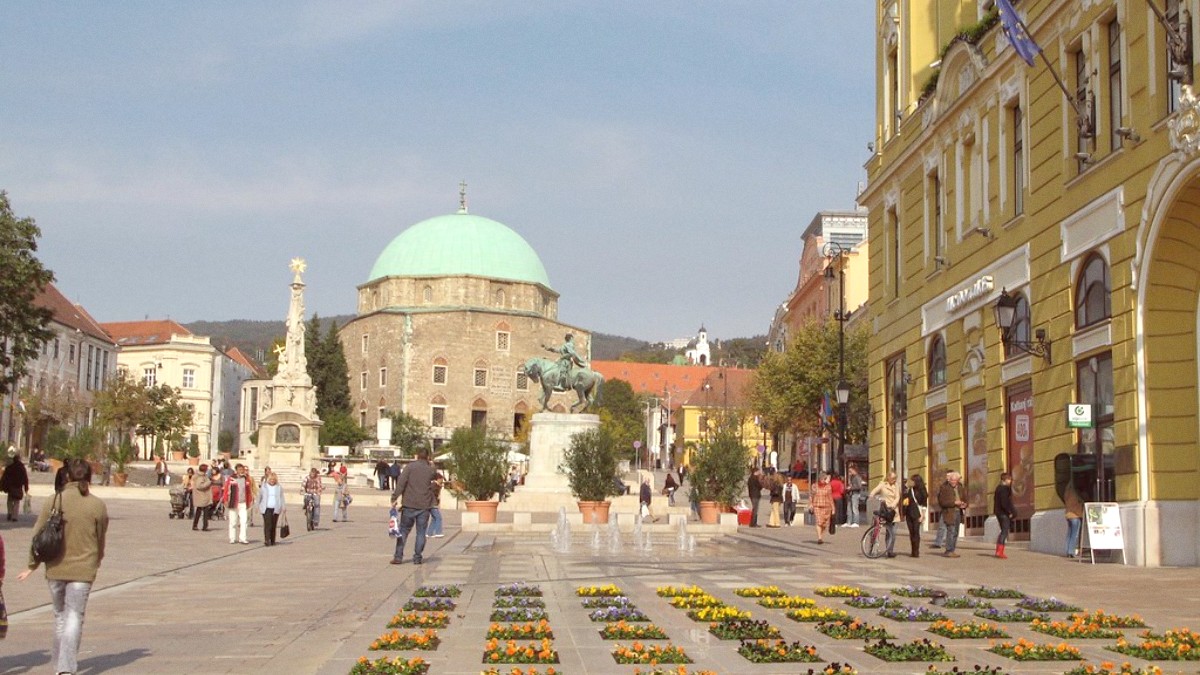
South Central Hungary, Hungary
Spring (April-May) in Pécs is generally mild and pleasant. Average temperatures range from 10-20°C (50-68°F). Expect moderate rainfall, which maintains green landscapes and floral blooms. Days lengthen, giving ample time for sightseeing and outdoor exploration.
Summer (June-August) brings warm to hot, sunny weather. Average temperatures hover between 20-28°C (68-82°F). However, heatwaves push temperatures above 30°C (86°F), especially in July and August. Occasional thunderstorms offer heat relief. This period marks Pécs's high season, drawing many visitors who enjoy the warmth and long daylight hours. Summer serves outdoor festivals and exploration of the city’s open-air attractions.
Sightseeing & Walking Tours: Spring (April-May) and Autumn (September-October) offer comfortable temperatures and pleasant conditions for exploring the city on foot.
Outdoor Activities (hiking, cycling): Late spring (May) and early autumn (September) give the best balance of warmth and comfortable temperatures for exploring the Mecsek Hills.
Warmest weather, outdoor events
Warm weather for activities, many outdoor festivals, long daylight hours.
Higher prices for lodging, larger crowds, midday heat possible.
Mild weather, fewer crowds
Pleasant weather for exploring, fewer crowds, lower prices, beautiful natural scenery.
Evenings can be cool, higher chance of rain.
Value travel, festive charm
Lower prices, fewer tourists, festive atmosphere in December, picturesque snow scenes.
Cold weather, shorter daylight, some attractions may close or have limited hours.
Hungary is part of the Schengen Area, which simplifies travel for many nationalities but requires specific documentation for others. For non-EU citizens, visa-exempt travelers will require an ETIAS authorization starting in 2025.
A passport valid for at least three months beyond your intended departure, with at least two blank pages. Proof of onward travel, sufficient funds, and accommodation may be requested. Travel insurance with minimum €30,000 coverage is a condition for Schengen visa applicants and highly advised for all.
For non-EU/EEA/Swiss citizens, for stays up to 90 days. Apply at a Hungarian embassy or designated center. IVisa, VisaHQ.
Many nationalities (US, CA, AU, NZ, UK, JP, KR, most SA) can enter without a visa for 90 days/180-day period.
Electronic travel authorization for visa-exempt non-EU nationals. Apply online, valid for multiple entries over three years.
Hungary has no general entry fees for tourists.
Currently no specific health-related entry requirements.
Pécs presents various price points, making it a destination suitable for different budgets.
The official currency of Hungary is the Hungarian Forint (HUF), symbolized as Ft. While Hungary is in the EU, it does not use the Euro.
Check your bill carefully. Many restaurants include a service charge ("szervízdíj"), typically 10-12%. If included, no additional tip is needed.
Single bus ticket: ~400 HUF (kiosk) or slightly more (driver). 24-hour public transport pass: ~1,300 HUF.
Hungary is generally a safe country, but awareness of common concerns and local services is good practice.
Ensure MMR, DTP, polio are up-to-date.
Hepatitis A and B. Tick-borne Encephalitis if in wooded areas. Consult a travel health clinic.
Use Insect Repellent with DEET, wear long clothing in Mecsek Hills. Check for ticks.
Sunburn/Heatstroke:
During summer, high temperatures and strong sun appear. Use high-SPF Sunscreen, wear a Hat and Sunglasses, and hydrate. Avoid prolonged sun exposure during peak midday hours.
Allergies: Seasonal allergies, especially in spring, present issues for some. Pack any necessary allergy medication.
Access to Healthcare: Public and private facilities. EHIC for EU citizens. Non-EU citizens: travel insurance is advised. Pharmacies (Gyógyszertár) are available.
General: 112. Ambulance: 104. Police: 107. Fire: 105.
Tap water in Pécs is safe to drink.
Standards are good. Choose busy street food vendors.
Pécs is generally a safe city with a low crime rate. Petty crime, like pickpocketing, happens in crowded tourist areas or on public transport. Take usual precautions: keep valuables secure, be aware of surroundings.
Travel insurance is highly advised for all travelers. A policy should cover medical emergencies, trip cancellation, and baggage issues.
Store 112 and your country's embassy/consulate number in your phone.
Keep digital and printed copies of passport, visa, insurance separate from originals.
Carry a card with medical conditions, allergies, and emergency contact details.